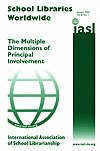From NJ to AZ, from techbrarian to ioradical tutorial builder back to 4th-8th grade school librarian, and from living with my spouse to living with my spouse and my parents and a black poodle named Morty
Friday, September 21, 2007
Cat Ladies
It doesn't matter that the cats are climbing all over each other to get what few resources are available, or that there are hurt and festering and starving cats all over the place. He refuses help from the outside because, of course, no one can take better care of the cats than he. Even if he is aware that there are cats in need, which I am not sure that he realizes, he thinks no one can provide the love and care that he does. So he keeps his cats hidden from others to prevent anyone from finding out his flawed caretaking, especially since he thinks others' caretaking abilities would inevitably be more flawed and damaging to the cats than his are.
As time goes on, the cats just get weaker or die off, while a few of the lucky ones manage to escape and run away. The cat lady just brings in more cats to replace former cats.
...more on this analogy later... or not
Thursday, July 19, 2007
School Library Advocacy Syllabus
"School Library Advocacy for Administrators" is a five-week, online training program for school administrators aimed at increasing background knowledge and understandings of the role a quality school library media program plays in the academic success of students. Taught by Debra E. Kachel, Adjunct Instructor, from Mansfield University in Mansfield, Pennsylvania, it was initiated with federal grant funds from the Institute of Museum and Library Services.
You go, Debra!
For a copy of Debra's Knowledge Quest article summarizing pre- and post-surveys from the 2003 course, click on Partners for Success: A School Library Advocacy Training Program for Principals
Wednesday, July 18, 2007
Assessing Learning/Librarians And Teachers As Partners
"Focusing on the role of library media specialists in assessing student learning, this is the first full-length book written to address its practical application in the school library media center. ... Though this topic appears in the theoretical literature and is addressed in journal articles or chapters in contributed books, this is the first practical in-depth analysis for the school library field."
Libraries Unlimited | Harada, Violet H. and Yoshina, Joan M. | 2005 ; ISBN 10: 1591582008 ; ISBN 13: 9781591582007
Wednesday, May 30, 2007
What I'm Reading Now...
Right now I'm reading "The Blue Book on Information Age Inquiry, Instruction and Literacy" by Daniel Callison and Leslie Preddy. Not your usual nightstand novel, but it motivates me to keep plugging away. You know the saying, "Take what you can and leave the rest"? Well, 660 pages is a bit much to absorb - tho' I am keeping the Avery write-on, self-adhering indexing tabs people in luxury cars and tropical vacations - but I love the fact that the book has theory and practical application mixed together.
Sunday, October 01, 2006
Teacher Training
"Despite these encouraging programs, [ones in which information on the role of the teacher-librarian be included in the training of pre-service teachers], it is apparent that most teacher-training institutions are not preparing new teachers to work collaboratively with the teacher-librarian. It may be that school-based teacher-librarians, workers in the field, as it were, will have to take the initiative and approach their closest Faculty of Education. We will need to initiate some liaison between teacher-librarians and the Department of Education at our local community college. We need to build a power base from which to influence the training of teachers and administrators—and of future school librarians (Hartzell, 1997).
"Rather than waiting passively, in the bottom half of a top-down model, for the arrival of new teachers fully cognizant of the role of the teacher-librarian, we need to be part of a continual loop; a reciprocal give and take of information and support between the Faculty of Education which is training the new teachers and the school system which is receiving them."
Wednesday, September 06, 2006
Ideal Teacher Preparation
Monday, September 04, 2006
Teachers? What about Principals?
Gary Hartzell, University of Nebraska at Omaha, USAAbstract
 There's no question that principal support is vital to the establishment and maintenance of a quality library media program. The problem is that support flows from trust, and trust flows from understanding. Many principals do not understand what teacher-librarians really do nor do they appreciate the potential the library media program has for contributing to student and faculty achievement. This article explores why this is so. Principals’ perceptions of school libraries and teacher-librarians have been shaped by four interactive forces. The first is their own experiences in school libraries as children, in which they perceived the library as peripheral to the classroom. The second is the effect of their professional training, in which the library's role in curriculum and instruction was conspicuously absent. The third is the nature of the teacher-librarian's work, which is to enable and empower others. The fourth is the low profile teacher-librarians and school libraries have in the professional literature read by teachers and administrators, which prevents them from updating their sense of what the library really is and can do. The cumulative result is that administrators have only a limited and inaccurate understanding of libraries and teacher-librarians. The only way to change principal perceptions is to assault them directly, repeatedly, and from a multiplicity of directions. Reshaping perceptions takes time and effort and commitment. In the meantime, these erroneous perceptions will continue to guide most principals' relationships with school library media specialists.
There's no question that principal support is vital to the establishment and maintenance of a quality library media program. The problem is that support flows from trust, and trust flows from understanding. Many principals do not understand what teacher-librarians really do nor do they appreciate the potential the library media program has for contributing to student and faculty achievement. This article explores why this is so. Principals’ perceptions of school libraries and teacher-librarians have been shaped by four interactive forces. The first is their own experiences in school libraries as children, in which they perceived the library as peripheral to the classroom. The second is the effect of their professional training, in which the library's role in curriculum and instruction was conspicuously absent. The third is the nature of the teacher-librarian's work, which is to enable and empower others. The fourth is the low profile teacher-librarians and school libraries have in the professional literature read by teachers and administrators, which prevents them from updating their sense of what the library really is and can do. The cumulative result is that administrators have only a limited and inaccurate understanding of libraries and teacher-librarians. The only way to change principal perceptions is to assault them directly, repeatedly, and from a multiplicity of directions. Reshaping perceptions takes time and effort and commitment. In the meantime, these erroneous perceptions will continue to guide most principals' relationships with school library media specialists.
copied from: School Libraries Worldwide Online School Libraries Worldwide Journal Citation: v8 n1 p92-110 Jan 2002
Especially because of the third factor, teacher-librarians can be perceived as personally pushy and demanding, rather than as intelligence, educated professionals concerned for the education of their students. Wouldn'tcha just love to do something about that?
Tuesday, August 08, 2006
School & Public Libraries Can Support Each Other!
- Welcome to LION, an information resource for K-12 school librarians, and
- Lesson Plans & Teaching Activities for School Librarians
Friday, August 04, 2006
SAVE YOUR SPACE
And remember, Congress does NOT want you to forward this message, put it on your profile, or use it as an away message.
Tuesday, August 01, 2006
Follow-up to "How the Teacher-Librarian Supports Teachers"
Teacher-Librarian Orientation for Student Teachers? I Can Dream...
- Develop a bibliography and/or pathfinder for a class unit of study
- Plan/implement library instructional experiences: book talks, information literacy skills, literature enrichment
- Respond to reference requests by students and teachers
- Develop a modified lesson plan for a special needs student based on a consultation with a special ed/resource teacher
I know I'm "preaching to the choir" when I'd really prefer to be "preaching to the converted," but see if you can follow this train of thought:
AND by definition, cooperation takes two or more people,
THEN instruct all of the cooperating parties how to optimize their collaborative efforts!
(Hey! Principal & supervisory certificates could be made contingent on teacher-librarian orientation activities, too!)
Friday, July 21, 2006
Teacher and Teacher-Librarian Cooperation
Cooperation takes time.
Not cooperating takes more time.
If you have access to EBSCOHost, search for this article: Teachers and Librarians: Collaborative Relationships. ERIC Digest., By: Russell, Shayne, ERICRIE0, 20000801Database: ERIC
Now, since ERIC Digests are in the public domain and may be freely reproduced and disseminated, I'll put some key points here:
- "Assignments developed in partnership between teachers and library media specialists are known to be more 'authentic'-exhibiting a higher degree of meaning and significance" (Gross & Kientz, 1999).
- "...test scores increase as school librarians spend more time collaborating with and providing training to teachers, providing input into curricula, and managing information technology for the school" (Manzo, 2000).
- Administrative Factors: "The greatest amount of collaboration occurs when the media specialist has a flexible schedule and team planning is encouraged by the principal" (Tallman & van Deusen, 1994).
- Interpersonal Factors: "It is up to the library media specialist to take steps to change this by serving on curriculum committees, attending planning meetings, and sharing ideas for integrating the media center into the curriculum" (Bishop & Larimer, 1999).
Wouldn't it be sweet if we could do something about changing the statement in #4 by including teacher/librarian collaboration in teacher training as well as school librarian training?
